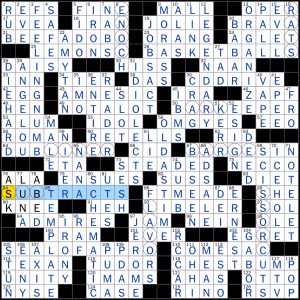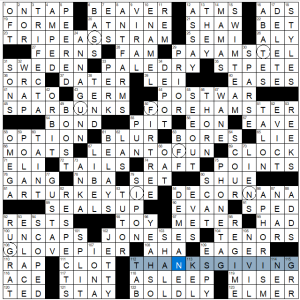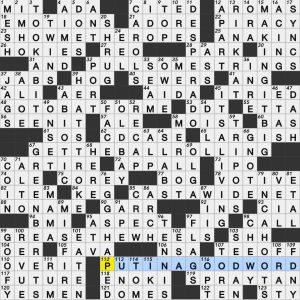Alex Eaton-Salner’s New York Times crossword, “Shape Up or Ship Out” — Nate’s write-up

11.24.2024 Sunday New York Times Crossword
This week’s Sunday crossword takes inspiration for its two-in-one theme from our title phrase, “Shape Up or Ship Out“:
“Shape Up” – Theme entries can be understood when you continue upward at the circled, upside-down shape at the end of the entry:
25A: LEMON SCONE [Citrusy breakfast treat] (turning up at the upside-down CONE in 8D ENOCH)
26A: BASKETBALL STAR [Sue Bird or Larry Bird] (turning up at the upside-down STAR in 16D RATS)
105A: SEAL OF APPROVAL [Imprimatur] (turning up at the upside-down OVAL in 86D FLAVORS)
110A: COMES ACROSS [Finds] (turning up at the upside-down CROSS in 69D SCISSOR CUTS)
“Ship Out” – Theme entries can be understood when you take out a circled ship from within the entry:
50A: BARKEEPER [Paging device] (BEEPER, once ARK it taken out)
64A: DUBLINER [Nickname] (DUB, once LINER is taken out)
67A: BARGES IN [Sloth, for one] (SIN, once BARGE is taken out)
84A: SUBTRACTS [Swaths of land] (TRACTS, once one SUBTRACTS SUB)
This was a pretty neat double act! Though some of the transformations (STAR, BARGE) weren’t as exciting as I’d have hoped, it felt all-in-all like a solid execution of the phrase-turned-theme and a fun solve. There were a few sections that bedeviled me (around the SUB in SUBTRACTS and around FT MEADE), hence the longer than average solve time, but it otherwise felt like a pretty smooth experience to me.
(Fun fact: CIRCLE is hidden backwards in author MICHAEL CRICHTON’s name! I wonder if that was one of the thematic transformations that fell to the cutting room floor as this puzzle was being developed?)
What did you think of the puzzle? Can you think of any other fun transformations that would’ve fit either half of this puzzle’s theme? Let us know in the comments section below – and have a great weekend!
Evan Birnholz’ Washington Post crossword, “Let’s Eat!” — Matt’s write-up

Evan Birnholz’ Washington Post crossword solution, “Let’s Eat,” 11/24/2024
I’ll have to come back later for a fuller review, apologies.
Our theme is a series of nonsense phrases (though some less than others) clued as both their silly selves and as the wordplay creating them; namely a first name bracketing (“eating”) a Thanksgiving food. Circled letters from each themer aptly spell STUFFING, as cued in the THANKSGIVING revealer.
Lance Enfinger and John Kugelman’s Universal Sunday crossword, “Going Into Labor”—Jim’s review
Theme answers are idiomatic phrases punnily clued as if having to do with specific occupations. The clues also tell the story of a job-seeker with an Amelia Bedelia-like headhunter.

Universal Sunday crossword solution · “Going Into Labor” · Lance Enfinger and John Kugelman · 11.24.24
- 23a. [“I’ve got the worst headhunter. I asked him to ___ and he sent my resume to a cowboy ranch.”] SHOW ME THE ROPES.
- 32a. [“I asked if he knew someone who can ___. He called a puppeteer.”] PULL SOME STRINGS.
- 48a. [“I wanted someone who’ll ___. He contacted a baseball team.”] GO TO BAT FOR ME.
- 67a. [“When I prodded him to ___, he showed me to a bowling alley.”] GET THE BALL ROLLING.
- 85a. [“I told him I needed someone who can ___. He put me in touch with a fisherman.”] CAST A WIDE NET.
- 99a. [“I pleaded that he ___. He pointed me to an auto shop.”] GREASE THE WHEELS.
- 112a. [“Finally, I snapped and told him to ___. That worked! He got me a job making crosswords.”] PUT IN A GOOD WORD.
Cute. Plenty of fun phrases here, and each one went in easily with just a few crosses thanks to the hints in the clues. I also enjoyed the meta punchline at the end, even if it was a little hokey. Nice job.
Even more, I think I enjoyed the long fill which was very lively with these entries: TOOK A BITE, DESPERADO, MAKING IT BIG, HEATSTROKE, “IT’S A LIVING,” EGG-SHAPED, GREEN BERETS, SPRAY TAN, and IN CAHOOTS. I’ve never heard RINK RAT [Hockey junkie], but it made sense. Also new to me: ABIOTIC [Devoid of life].
Clues of note:
- 82a. [Star date?]. ITEM. Still not making sense of this. I can think of at least a couple different interpretations.
- 84a. [57-Across]. KEG. 57a is ALE [84-Across contents]. So how is the clue for KEG simply ALE? This should be [See 57-Across].
- 119a. [Coat of arms?]. SPRAY TAN. Nice clue.
- 50d. [Heel’s opponent, in wrestling lingo]. FACE. I don’t know the lingo, so I’ll take the puzzle’s word for it.
Enjoyable smooth puzzle. Four stars.
NYT: The theme seemed a little uneven to me. The “ship out” answers are all legitimate entries with/without the “ship,” but the “shape up” answers are meaningless (except for BASKETBALLS) without the “shape.”
Liked the clues for RETELLS and CHEST BUMP.
Thought the cross of 56-D and 73-A was apropos, because STEADED is certainly ancient.
That inconsistency bothered me too. I looked for some further element to the theme but couldn’t find anything.
I kept looking, too, for something more to hold the puzzle together, especially since the title phrase isn’t one that I’d ever use myself. (Maybe I’m not military enough.) Felt like two puzzles, each with its own theme along a familiar line.
There were a few things I didn’t know, like the wireless toy, but nothing awful. I trust that SCISSORS CUT is a real term.
That would have been really impressive!
It seemed pretty ambitious as it is, though. Without being too difficult.
NYT: I’m 99% positive Merl Reagle (RIP) included a clue/answer combo involving “CIRCLE” being hidden backwards in MICHAEL CRICHTON in one of this Sunday puzzles. Don’t recall if it was the theme, or just a fun bonus thing he threw in (it was Merl!), but I remember it was a fun bit of trivia to discover.
I couldn’t find that one, but, searching, I did come upon two similarly themed (but no ships) puzzles that actually do contain MICHAEL CRICHTON. Really cute how all three bloggers remarked on how cool–or just… remarkable–CIRCLE appearing backwards in the name is.
https://crosswordfiend.com/2020/08/12/thursday-august-13-2020/#wsj
https://crosswordfiend.com/2021/06/22/wednesday-june-23-2021/#ny
NYT – Thank God! Classic, old school theme that actually could be used to solve the theme answers and not just some visual, that can only be seen after the puzzle was completed.
NYT: Several things I didn’t like, although the puzzle as a whole was OK. Didn’t like “amnesic” for 43A — a person with amnesia is an amnesiac, while amnesic is more like what’s causing the amnesia (to me, at least). Never heard of a “notelet” or an “rc car.”
I had that same thought about “amnesic” but then realized it is the adjective that describes the character.
RC CARS were quite common when my children were small; but that’s been a few years, and I can’t speak to the question of their current popularity. I agree that NOTELET is a weak entry.
But overall, I thought this was an outstanding Sunday puzzle: enough shenanigans going on to sustain interest, and some very clever clues.
Hmmm… I see your logic, but still dislike “amnesic.” I don’t have children, so toys have to be pretty popular (think Cabbage Patch dolls) or something to reach my attention. :) As I mentioned, I think the puzzle as a whole was OK — I kind of liked the theme.
OK, can someone explain COMESAC for [Finds]? Apparently it’s correct and I don’t get it at all
It’s one of the “shape up” answers — COMES A(CROSS), with CROSS going up.
Oh, for God’s sake. Duh.
Worth reading (and I’m pretty sure someone else linked this here previously):
“Why ‘orang’ is no substitute for ‘orangutan’
https://www.orangutanssp.org/orang-vs-orang-utan.html
Thanks for the link.
Frankly, I don’t care if “orang” implies something else (human) in Malay that no English speaker has ever seen. I’m writing right now in English, and a first principle of language is that etymology can provide interest and and insight but is in no way the same as meaning. “Orang” meaning orangutan is in all dictionaries without qualification, dated in MW to 1778, not to a degenerate internet stage of language. While I’d never use it myself outside puzzles (as it sounds desperate to please with something breezy), MW also has examples.
It’s hard to be patient with people who think that their preference can override not just some recent speakers, in order to salvage a real distinction arguably worth preserving (and thus enhancing the power of English usage), but native speakers as a whole. You can still write according to your preferences but not object to a puzzle answer as thereby incorrect.
The one about commas inside quotes this week, a usage I learned what must be 60 years ago and enforced for at least half that as an editor, particularly got me. And style manuals are prescriptive, not a summary of where they think the latest trend is going.
To be fair, the point being made about “orang” is that it’s offensive, not just wrong. You probably know my feeling on such censorship: it’s crazy that the Spelling Bee takes PAPPY but not MAMMY, so I agree with your argument that “orang” is acceptable in English. But we shouldn’t mock those who are more sensitive to other cultures. I see their point but English usage is not Malay usage.
Fair enough, and I apologize for my intemperate tone. I guess it’s just that some of the “expert” or “esthetic” complaints about language use are getting to me.
I think of myself as a pedant. I won’t use, say, “diffident” to mean indifferent or “literally” to mean something like an exclamation point. I cringe whenever I see “disinterested” to mean “uninterested.” Still, at least it’s about preserving distinctions that I think prove useful, and I’d never ask, in effect, to have my own dialect of English (cf. Wittgenstein on private language).
To be honest, I’m not covinced that “orang” is offensive. First, it seems odd to think that English speakers using an English word could offend someone speaking another language. If the f word turned out to coincide with the ordinary Japanese word for hat, I wouldn’t be offended by Japanese milliners.
Besides, I gather that the etymology for “orangutan” breaks down as man + forest, so it’s already specifically a man of the forest, which can hardly offend men by reducing them to another species, and if it did it wouldn’t still be in use. And then, too, abridging it to the part meaning man can’t make it any worse, no?
I’m not unsympathetic to your point, John, but for me it comes down to “If I can avoid offending someone by using a few more syllables, why not do that?”
There are enough people out there who go around offending others. The least I can do is not be one of them.
+1 and very well written!
UNI-SUN: Jeff Chen’s editing needs improvement, and as an example, his clue for 121A is “Noggins” and the answer is “Domes”. Maybe he should have edited the clue to have it say “Chrome-like Noggin”. Because of that lapse, I rated the puzzle with 2 Stars.
I think “dome,” with or without “chrome-” is acceptable slang for “human head.”
The promiscuous editors at Merriam-Webster would agree with you, Gary (see Sense 7).
https://www.merriam-webster.com/dictionary/dome
Those descriptive whores!